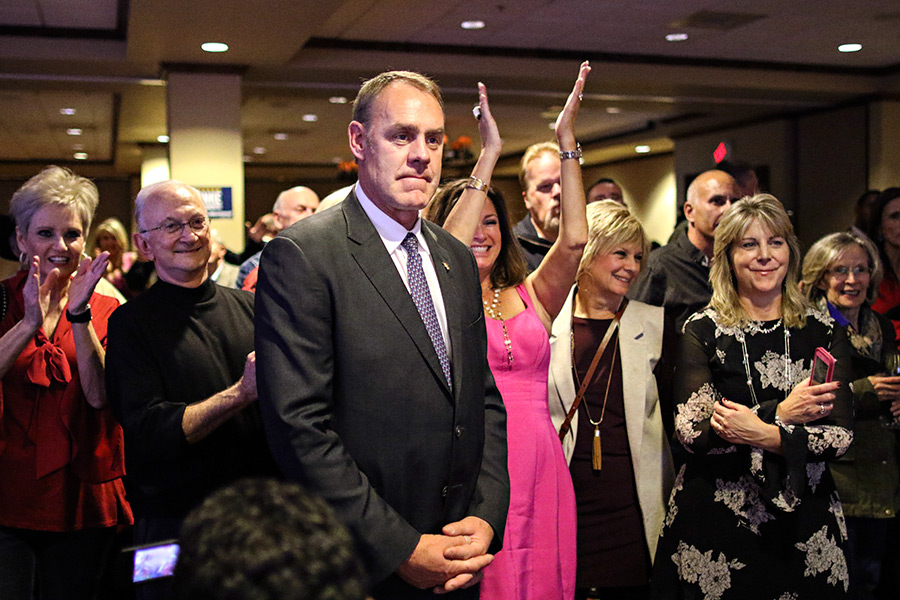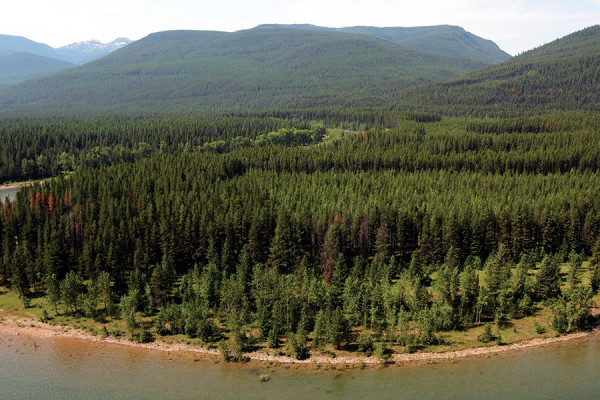Zinke Remains Mum on Interior Secretary Selection
Montana Congressman has not yet announced Wednesday whether he would accept
By MATTHEW BROWN, Associated Press
BILLINGS — Rep. Ryan Zinke of Montana made no secret of his ambitions to join a Donald Trump Cabinet, and yet his nomination as interior secretary is in some ways an unlikely fit for the retired U.S. Navy SEAL.
Zinke, 55, was an early supporter of the president-elect and publicly expressed his interest in a Cabinet post when Trump visited Montana in May.
Like other Western states, Montana’s wide-open, rugged landscape has a huge federal presence. The Interior Department and other U.S. agencies control almost a third of its land and even more of the underground “mineral estate” that holds vast amounts of coal, oil and natural gas.
As with several other Trump Cabinet nominees, Zinke has advocated for increased energy drilling and mining on those lands and expressed skepticism about the urgency of climate change.
The Republican lawmaker, who describes himself as a “Teddy Roosevelt Republican,” also has been a vocal supporter of keeping public lands in the government’s hands. That’s a central political issue in Montana, where hunting and fishing access is considered sacrosanct.
The president-elect’s son Donald Jr. is an avid hunter and was in Montana on a hunting trip last month, during which Sen. Steve Daines recommended Zinke for Interior. That and Zinke’s stance on public lands may have given him an advantage over another lawmaker Trump was said to have considered for the post, Rep. Cathy McMorris Rodgers, R-Wash. She wrote on Facebook Tuesday that it had been an “honor” to be invited to meet with Trump.
Zinke was offered the job after meeting Monday with Trump in New York, according to two people with knowledge of the matter. A person close to Zinke confirmed the offer. All three spoke on condition of anonymity because they were not authorized to discuss the transition process publicly.
Zinke had not yet announced Wednesday whether he would accept.
Energy development, land management and hunting fall under the Interior Department’s jurisdiction. However, those were second-tier issues for Zinke during his successful re-election campaign this fall against Democrat Denise Juneau.
In interviews with The Associated Press during that campaign, Zinke repeatedly identified his top priorities as national security, more thorough vetting of refugees to screen out terrorists, the repeal of the Affordable Care Act and improving the U.S. economy.
Only after listing those did he list his desire to increase coal mining and oil and gas exploration, protect public lands and provide more resources for American Indian tribes, another Interior responsibility.
News of his selection was welcomed by Montana’s Confederated Salish and Kootenai Tribes and at least one conservation group, Backcountry Hunters and Anglers. The president of the Missoula, Montana-based hunting group, Land Tawney, called Zinke a “potential ally” in the effort to balance energy development with preservation.
“There are places too important for drilling, and in other places we can do phased development. Mr. Zinke understands that,” Tawney said.
Other groups slammed the selection. The Northern Plains Resource Council accused Zinke of “shortchanging the public” with his opposition to pending Obama administration moves to reform the federal energy leasing program.
Replacing Zinke will require a special election be held 85 to 100 days after he’s confirmed by the Senate, Montana Republican Party Chairman Jeff Essman said. State law says Montana’s governor could make an interim appointment from a list of three nominees, but Essman said that’s superseded by a provision in the U.S. Constitution that requires an election.
A spokeswoman for Gov. Steve Bullock said he “will be taking a close look at the law when he returns” from a meeting of the Western Governors Association.
Zinke spent 23 years as a Navy SEAL, serving in Iraq, Kosovo and elsewhere. He was awarded two Bronze Stars for combat missions in Iraq. He currently serves on the House Natural Resources and Armed Services committees and describes himself as “a steadfast advocate for Montana veterans and military personnel and families.”
He made an unsuccessful 2012 run for Montana lieutenant governor before shifting his ambitions to Congress when former Rep. Denny Rehberg decided to take on Sen. Jon Tester, a Democrat. Zinke had been considering his own challenge to Tester in 2018.
Tester congratulated Zinke in a statement Wednesday and said he was pleased someone from the West was chosen for the post.
Zinke has raised doubts about climate change as “unsettled science.” But he’s also said that “something’s going on” with the climate and that an energy strategy that includes renewable sources such as wind and solar would be prudent.
Montana boasts the largest coal reserves in the nation. Zinke has warned environmentalists and the Obama administration that to take coal out of the energy mix would be “a disaster.”
“I don’t agree with keeping it in the ground,” he said in a debate before his re-election.
Democrats have attempted to label Zinke as a radical who would sell off federal lands to private interests or transfer them to state control. Zinke has adamantly denied the charge, which was based on a pledge Democrats say he signed in 2012. Zinke has said he can’t remember signing the pledge.

Things to Know About Federal Land Policies Under Trump
SALT LAKE CITY (AP) — Advocates for more state control of public lands and fewer government regulations on energy development hope Donald Trump will be more receptive to their cause, which they say has been ignored during President Barack Obama’s two terms. A look at some key questions:
___
WHAT’S AT STAKE?
Decisions about what activities are allowed on hundreds of millions of acres of federal land, more than half of them concentrated in 12 Western states. The landscape includes expansive deserts, snow-capped mountains and red rock canyons. The lands are treasured by outdoor enthusiasts and vital to cattle ranchers, oil companies and loggers. States such as Alaska, Idaho, Nevada and Utah, where federal lands account for the majority of their territories, have long complained that regulatory agencies pay too little heed to residents’ needs.
___
WHERE ARE THE BATTLE LINES DRAWN?
Efforts to wrest control from the federal government are being waged in state legislatures and Congress and might wind up in court.
Dozens of demands for land handovers have surfaced in the West in recent years, with Utah pushing hardest. A law it enacted four years ago demanded that the federal government relinquish control of public lands in Utah by 2014. The deadline passed with no action, and the state has since spent about $2 million on outside attorneys to prepare a longshot lawsuit. Utah’s GOP-controlled Legislature wants to proceed, but the state attorney general has yet to agree.
___
WHAT DO PROPONENTS OF LESS FEDERAL CONTROL SAY?
Supporters, mostly Republicans, say Washington-imposed limits on use of natural resources deprive Western states of growth, jobs and tax revenue, a burden not shared by Eastern states where the federal government owns much less property. They argue the federal government is a poor manager, citing overgrown forests ripe for catastrophic wildfires. They contend states can balance conservation with energy exploration to protect outdoor recreation while stimulating local economies.
___
WHAT DO OPPONENTS SAY?
Opponents fear states would sell off lands that belong to all Americans and allow oil drilling, mining and clear-cut logging, ruining cherished landscapes. They consider federal land managers even-handed protectors of valuable cultural and natural resources. They say state control would limit access for hunting, fishing and other recreation while splintering wildlife habitat. In a warning of what could happen without federal protection, the Southern Utah Wilderness Alliance ran TV ads this year with altered pictures of oil derricks near the state’s iconic red rock lands.
___
WHERE DO THE PRESIDENT-ELECT AND HIS CHOICE FOR INTERIOR SECRETARY STAND?
Trump’s stance is murky. He has pledged to honor Theodore Roosevelt’s conservation legacy. But he also promises to “unleash” energy production on federal property. Trump told Field & Stream magazine in January that he opposed transferring ownership to states because states might sell the land. But that same month, he wrote a guest newspaper column in Nevada endorsing state control, which the GOP platform supports, and vilifying “faceless, nameless bureaucrats” in federal management agencies.
Trump has offered the job of interior secretary to Rep. Ryan Zinke of Montana, who has not said whether he will accept. Zinke has been critical of federal land management and wants more development of coal, oil and natural gas. But he’s an outspoken supporter of keeping the lands in federal hands and resigned as a GOP convention delegate over the platform’s opposition.